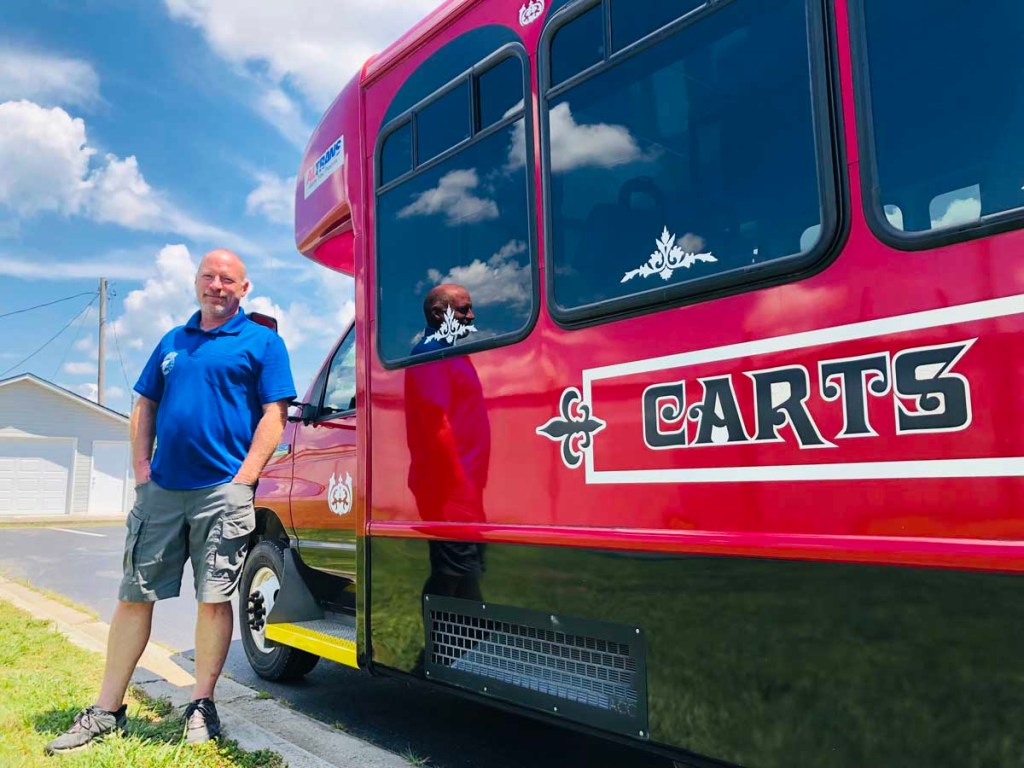Driver demand
Published 5:00 am Thursday, July 7, 2022

- CARTS driver Deric Bell is seen Wednesday afternoon.
Before the COVID-19 pandemic arrived in early 2020, the Cullman Area Rural Transportation Service (CARTS) had more than 30 drivers, running a fleet of almost 40 buses that served local residents to the tune of 80,000 passenger trips per year.
Now, CARTS has 17 drivers and 31 vehicles — with half of the 14 new buses it’s ordered this year remaining undelivered, thanks to ongoing supply chain issues. For now, though, the smaller bus fleet isn’t the chief problem the service faces: finding drivers to shore up its post-pandemic staff is.
“If we could get at least ten more drivers, we’d at least be able to run the routes we really need to be running,” says CARTS director Joyce Echols, who notes the service hasn’t been able to scale back to its pre-pandemic route itinerary because there simply aren’t enough drivers to address the demand.
“Because of that, we haven’t been able to add back all the things that got cut away during COVID,” she explains. “We are able to run the necessary things — taking people to doctors’ appointments, dialysis, shopping trips for things like groceries. But there are still things we can’t do that our riders are asking for; things they were accustomed to before COVID, because we just can’t handle the load.”
CARTS is actively working to remedy its driver shortage, seeking to fill job vacancies to replace the 10 drivers who left the service during the pandemic. “Since things began opening back up and the masking requirements ended, our ridership has picked up — but our driver situation has not improved with it,” says Echols. “We’ve hired seven drivers in the past year, but we lost enough drivers that we’re still in the same boat we were in at the height of the pandemic.”
To showcase the perks of being a CARTS driver, the service has produced a recruitment video featuring testimonials from current drivers who say it’s gratifying to provide a service that many of their community neighbors — either for medical, financial, or temporary circumstantial reasons — wouldn’t otherwise be able to provide for themselves.
“I absolutely love this job,” driver Cindy Burgett confesses in the video. “It’s been my favorite job I’ve ever had. I probably love it too much, really! You get to meet great people; you get to go all over the county; you get a blessing out of it, helping people. This service is wonderful; it’s a blessing to so many people who can’t have the opportunity, or don’t have the opportunity, to get out. It’s a wonderful place to work…I work with the best people.”
CARTS is jointly funded through an annual appropriation of federal transportation money (via the Section 5311 program administered by the U.S. Department of Transportation) and the Cullman County Commission. Reduced-rate fares for riders, as well as mobile advertising, also help defray minor costs the county would otherwise need to pay. In 2019, the service operated at full scale on a combined annual budget of $1.07 million.
Now that the pandemic has subsided, rider demand is definitely surging closer and closer to pre-COVID levels. Just past the midway point of 2022, year-to-date ridership is approaching 40,000 trips, which closely compares with the pace the service set on the eve of the pandemic in 2019.
“It’s growing every day,” says Echols. “People are ready to get back on the bus. We just need the drivers who can take them all the places they’d like to go.”
To inquire about driver opportunities at CARTS, contact the service by phone at 256-734-1246 and ask for director Joyce Echols or assistant director Gary Campbell.





